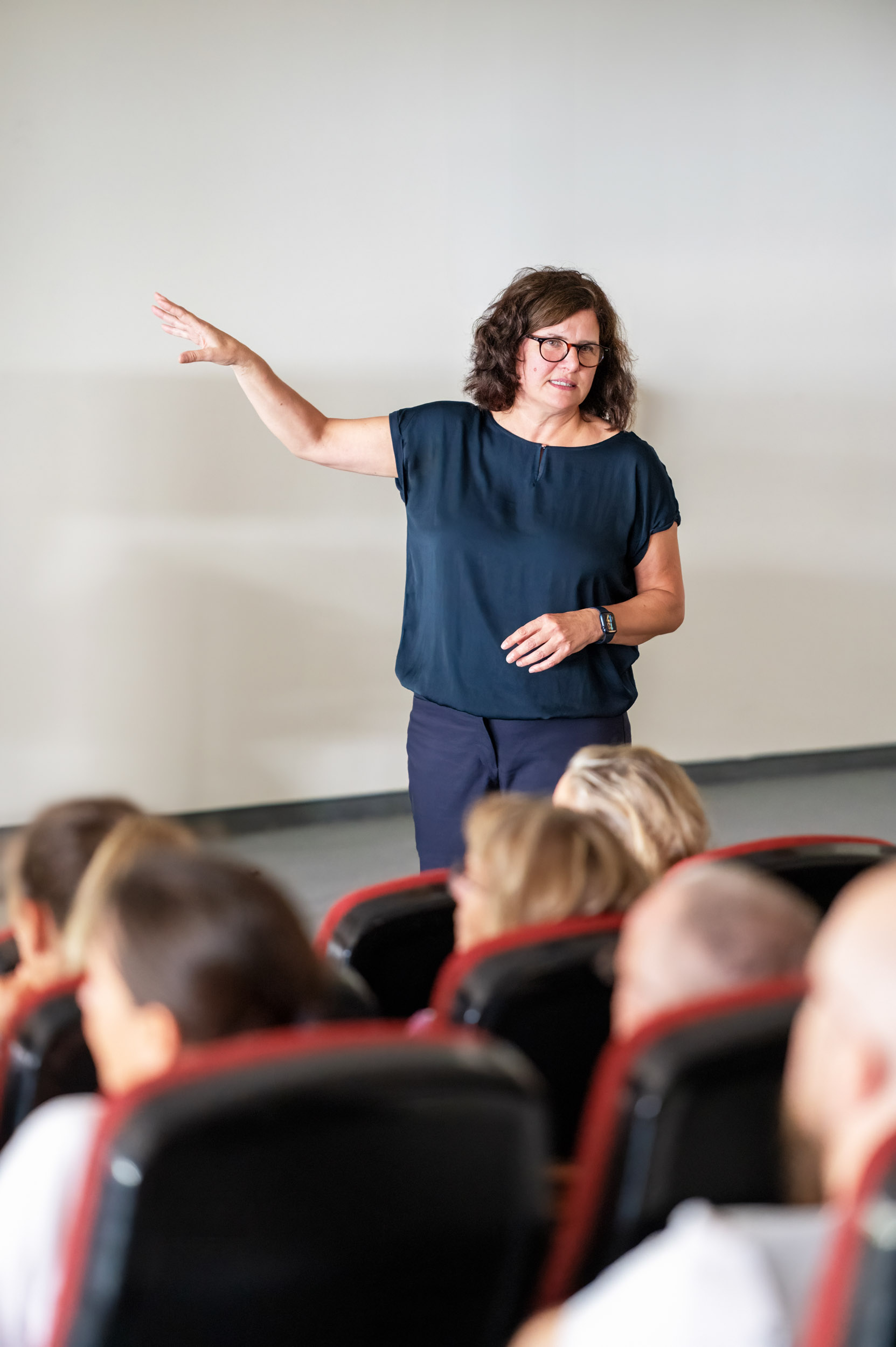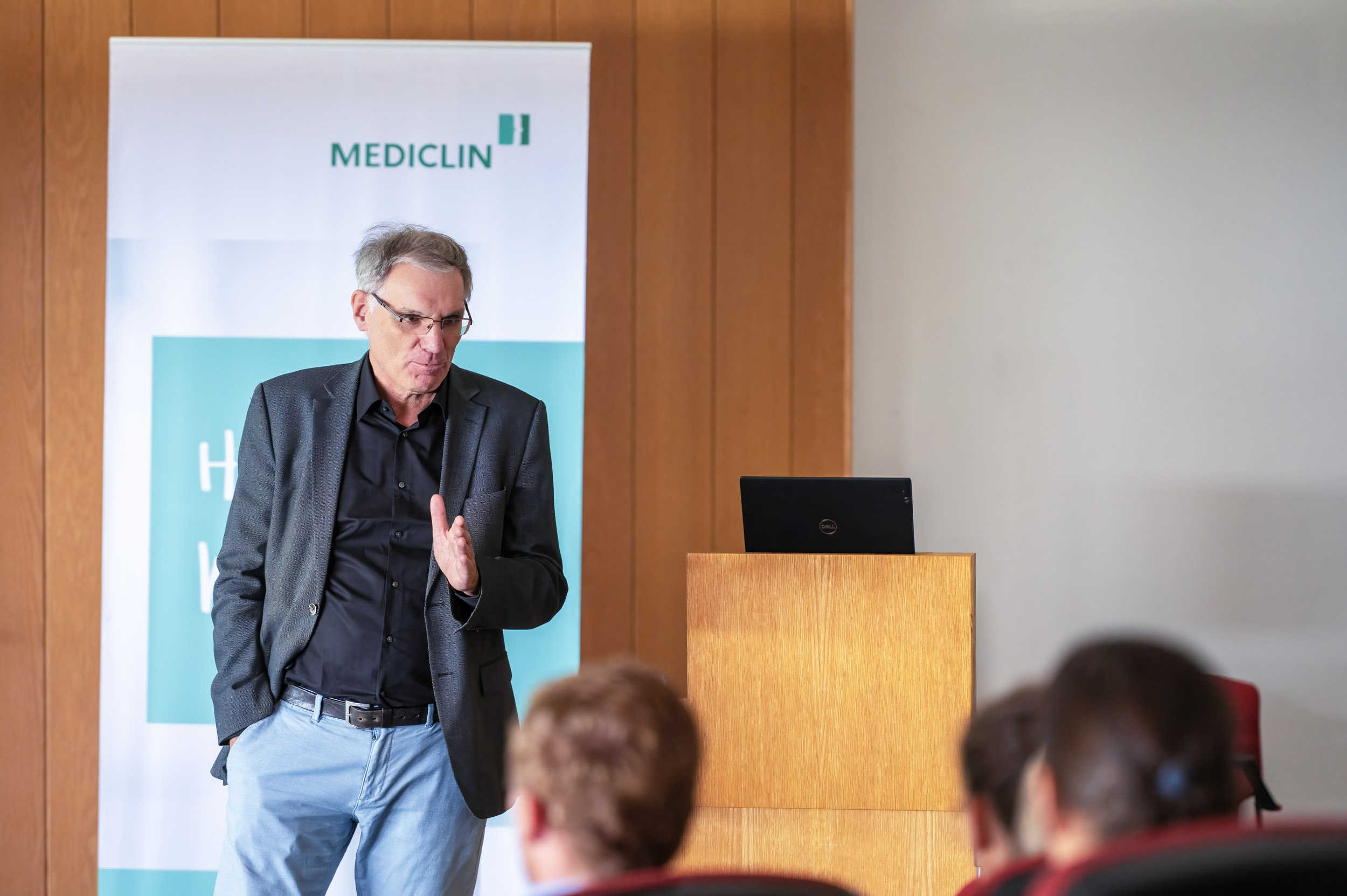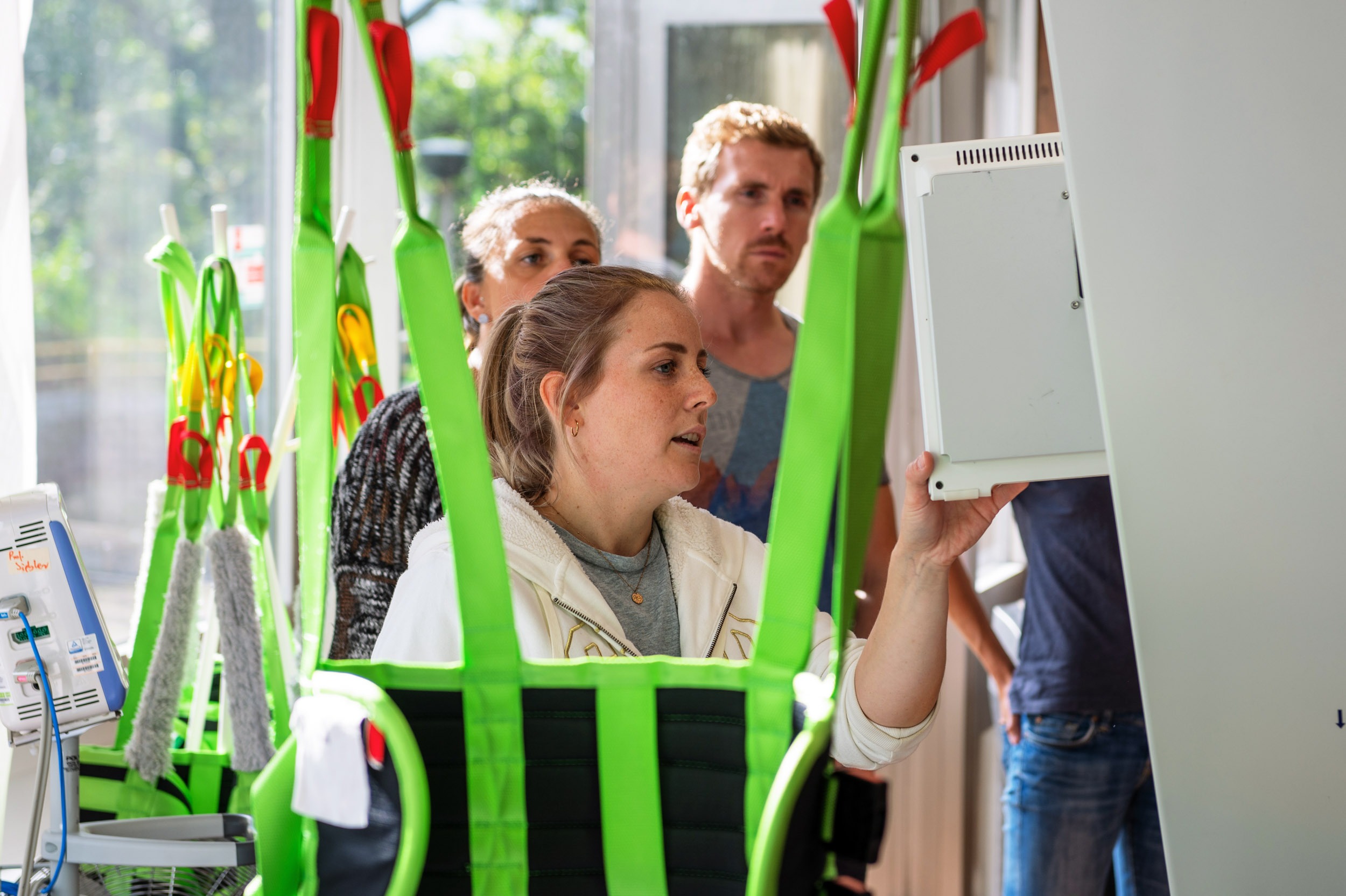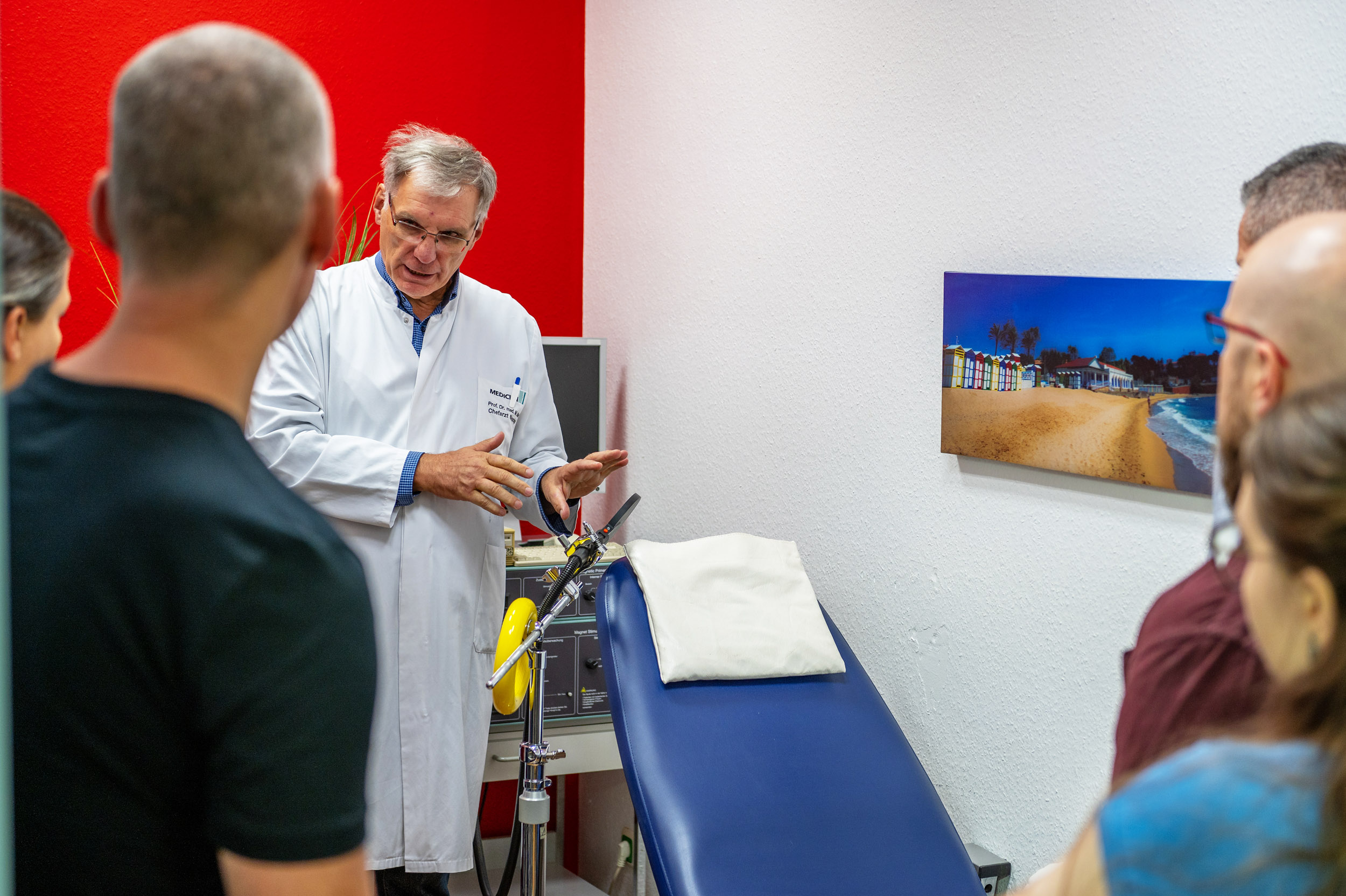
Discover highlights from the THERA-Trainer Symposium 2023 in Essen – early mobilisation, international guidelines, gait labs, and robotics-based therapy. A forward-thinking event for modern neurorehabilitation.

In the late summer of 2023, experts and specialists from the field of gait rehabilitation gathered for a pioneering symposium at the Mediclin rehabilitation clinic in Essen. The clinic, which specialises in neurological, orthopaedic and geriatric rehabilitation, was the perfect setting for the THERA-Trainer Symposium, which left a strong impression with its innovative approaches and practical insights.
Dr Meves, head physician at Mediclin Essen, opened the symposium with an impressive presentation on early mobilisation and post-intensive care syndrome. In her speech, she combined professional eloquence with a high degree of practical relevance, which delighted the participants.
Dr Meves used case studies to illustrate the importance of early mobilisation for patients, placing a clear focus on the practical implementation of the theoretical concepts. Her interactive style enabled a direct professional discourse with the audience, giving the event a dynamic atmosphere from the very beginning.
The presentation not only focused on the technical aspects of early mobilisation, but also emphasised the challenges and opportunities that arise in rehabilitation following intensive care. The intensive discussion and the large number of questions asked reflect the participants’ keen interest in this forward-looking topic. Dr Meves was instrumental in raising awareness of the importance of early mobilisation and providing participants with practical insights into post-intensive care rehabilitation.

The patron of the symposium, Prof Siebler, former head physician of the clinic and head of the Mediclin Research Centre, followed up the opening speech with an inspiring question: Will the use of technology in rehabilitation lead to new job profiles such as rehab technician? His presentation set the tone for two days of intensive dialogue on developments in rehabilitation.
Prof Siebler shed light on the research work at the Mediclin Research Centre and asked critical questions about the future development of rehabilitation. In particular, he addressed the challenges and opportunities presented by the increasing use of technology in rehabilitation. With his refreshing style and many years of experience in rehabilitation, he got the participants thinking about the future role of therapists and the integration of technology into therapeutic practice.

Lena Flöter, a physiotherapist specialising in neurology and an expert in gait rehabilitation at Mediclin in Essen, showcased the gait laboratory concept by way of case studies and practical examples. In addition to organisational aspects such as planning, organisation and patient allocation, she also addressed the individual objectives of therapy. Her presentation led to a lively discussion in which many questions were asked, and the discussions continued into the subsequent coffee break.
The second series of lectures started with Sabine Lamprecht, an MSc. in neurorehabilitation. Her comprehensive overview of international guideline recommendations for gait rehabilitation emphasised the importance of a task-specific, highly repetitive training approach. Lamprecht, renowned for her uncompromising advocacy of evidence-based practice, critically examined traditional concepts and presented well-defined perspectives.
Sara Ruppert from the Diana Klinik Bad Bevensen presented a practical insight into the organisation and implementation of a gait laboratory in a clinic setting. Ruppert went into detail about the planning and development process of the gait lab, including the current status quo at the clinic. Specifically, she pointed out that subgroups tailored to the varying ability levels of neurological patients could be created for a coordinated circuit training programme in the gait lab. Her presentation illustrated how patients can train at individual stations with the therapy and robotic devices from THERA-Trainer.
Kathrin Neissendorfer, occupational therapist and owner of erGO Konzept, rounded off the series of lectures. She used concepts and examples to illustrate that modern device-assisted gait rehabilitation is relevant in not just the inpatient but also the outpatient sector. Her contribution provided valuable insights into the possibilities and potential of device-assisted gait rehabilitation (“End-effector gait training as the key to mobility”, page 34).
The first day of the event ended with a joint kitchen party, which created an informal atmosphere for further professional and social dialogue.
The second day of the symposium gave participants the opportunity to gain personal insights into practical applications. While one group of participants was guided through Mediclin Essen by Prof Siebler and given exclusive insights into the Mediclin Research Centre, Lena Flöter gave the other group an insight into the gait laboratory. Participants also had the opportunity to test the lyra end-effector gait trainer from THERA-Trainer for themselves.

The programme concluded with a practical colloquium in which the participants themselves developed important aspects and criteria for the design of modern gait rehabilitation. The enthusiasm of all participants was reflected in an intensive exchange on specialised topics and experiences. This interactive workshop helped to bring together the diverse perspectives of the participants and jointly identify important findings for modern gait rehabilitation.
The THERA-Trainer Symposium 2023 at the Mediclin Essen was not just a success in professional terms; it also inspired the participants with a variety of opportunities for exchange and exciting content.

Special emphasis was placed on the opportunity to exchange ideas with colleagues from different areas of rehabilitation. The event’s interdisciplinary approach enabled participants to gain insights beyond their own specialty and promoted professional dialogue. The extensive questions, lively discussions, and exchange of insights during the presentations and workshops emphasised the high level of interest and the relevance of the topics discussed.
Another decisive factor for the success of the symposium was the clear focus on technical content. Despite the support of industry partners, the focus was not on promotional aspects but on knowledge exchange and networking. The participants appreciated this focused approach, which helped to turn the event into a platform for high-quality exchange and innovative ideas.
Overall, the positive feedback from participants indicates that the THERA-Trainer Symposium not only offered informative insights into modern rehabilitation technologies, but also created an inspiring atmosphere for joint learning, discussion and networking.

Related contents
Find related exciting contents in our media library.
Meet our specialists.
Are you interested in our solutions? Schedule a meeting with a Consultant to talk through your strategy and understand how TEHRA-Trainer can help you to advance rehabilitation.
You need to load content from reCAPTCHA to submit the form. Please note that doing so will share data with third-party providers.
More InformationYou are currently viewing a placeholder content from Turnstile. To access the actual content, click the button below. Please note that doing so will share data with third-party providers.
More Information